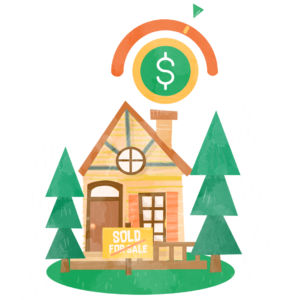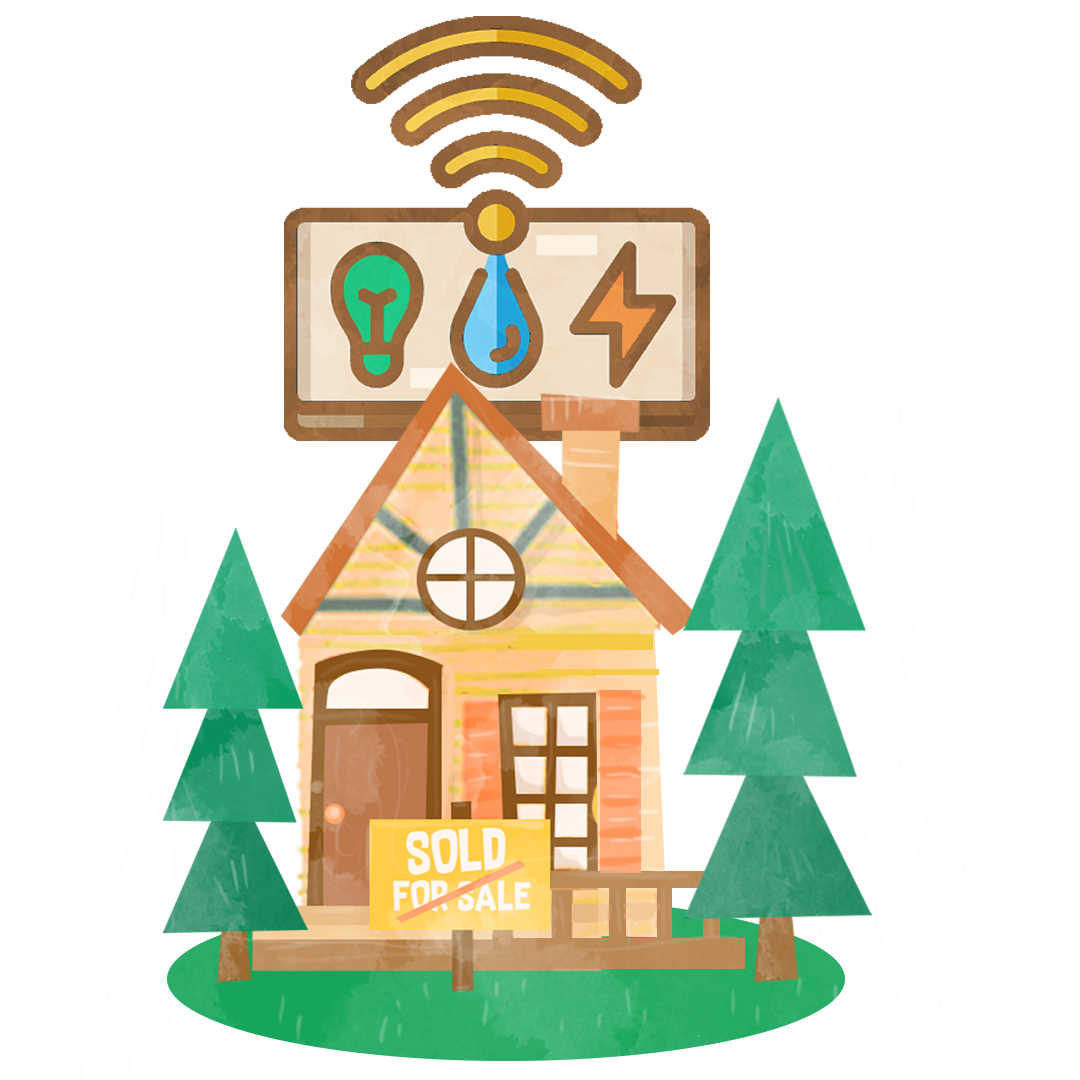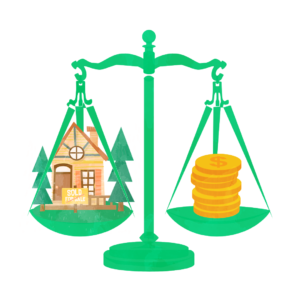
If you’ve ever had to open your window in January because the landlord has the thermostat locked and it’s 95 degrees in your apartment, the question “should I buy a house?” might just have passed through your mind.
Actually, the answer is simple: despite potentially high upfront costs, buying a house is usually an excellent idea — if you can swing it.
In the paragraphs that follow, we’ll break down all the potentially prohibitive costs associated with owning a home and then lay out the myriad financial benefits that come with home ownership ultimately demonstrating that — if you can — you should definitely buy a house.
Before we get to the exciting stuff, let’s take care of the bad news: there are quite a lot of costs associated with purchasing a house that can be prohibitive.

The first major expense that comes with home ownership is a battery of fees that fall under the umbrella of “closing costs.” These generally cost between 2% and 6% of the overall purchase price of the home, and are paid at the time of closing. Here’s a breakdown of the major expenses that get factored into closing costs:
This is the percentage of the overall purchase price that you pay up front to your mortgage lender. The amount you’ll need to pay as a down payment varies, depending on a few different factors, however a standard conventional loan often requires 20% down.
There are, however, ways to avoid needing so much cash on hand up front. The Federal Housing Administration (FHA), for example, certifies loans for first time homebuyers. Many banks offer FHA loans that only require a 3.5% down payment.
More and more banks have also begun offering lower down payment mortgages, even if you don’t have an FHA backed loan. You could get a conventional mortgage with a down payment as low as 5%, depending on which bank you use.
Be aware: if you put less than 20% down, you will be required to pay Private Mortgage Insurance (PMI) as a part of your monthly mortgage payments. (More on that later.)
Before a bank will offer you a mortgage, they need to verify that the value of the home is enough to secure the home loan. And so, you’ll need to order an appraisal of the home. This tends to cost anywhere from $500 to $1,000, depending on where you live.
Most conventional mortgages use an escrow account to automatically pay insurance and taxes. That’s not quite as nice as it sounds, though: it’s still your money that you have to put into the account as part of your monthly mortgage payment.
Banks tend to want at least two months’ worth of insurance and tax payments in the escrow account up front, though, which you pay at closing.
The exact cost to fund your escrow account will vary depending on the property taxes where you live, the value of your home, and the level of insurance you have on the property.
Banks charge fees for giving you hundreds of thousands of dollars. They usually amount to about 1% of the amount you borrow.
If you have a government-backed mortgage (like an FHA or USDA or a VA loan), there will likely be an upfront cost to insure the loan in the event that you can’t pay it. These are in addition to PMI, which gets charged monthly.
If you’re taking out a mortgage in order to buy a house (as opposed to paying in cash), the bank is going to require that you prepay a year’s worth of home insurance.
The exact cost of this will depend on where you live, the size of the home, its initial condition upon purchase, etc., but you can generally expect this cost to range in the thousands (but not tens of thousands) of dollars.
When you buy property, you and the seller each split the year’s property taxes. So, depending on how much of the year has passed when you purchase the house and what your municipality’s property tax rate is, this expense will vary.
You can expect to spend another couple thousand dollars on ensuring that the title company accurately transfers the title for the property into your name and insuring the lender against any mistakes the title company might make.
There are a variety of other, smaller costs that come with purchasing property. Things like government recording fees, pest inspection fees, and tax monitoring fees.
The nice thing about all these fees is that they won’t amount to more than $1,000 all together, and you don’t actually have to do anything extra to make sure they happen. They’ll just be more numbers on your incredibly long purchase agreement.
Once you’ve successfully bought a house, you’ll have a few recurring, monthly expenses.
Obviously, you’re going to have to make monthly payments to your lender. These payments include paying down your principal loan balance and also a mortgage interest payment.
If you take out a 30 year mortgage, your monthly payments will start off by mostly paying off mortgage interest. Over the course of the loan, your monthly payment will cover more and more of the actual principal loan balance.
PMI is assessed to loans that have lower than 20% equity. It’s basically insurance your bank requires you to pay just in case you default on your loan.
How much PMI will cost depends on a lot of factors, including how much you owe on the home, how much you were able to put down, your debt-to-income ratio, and your credit score.
Generally, if you’re an average person buying an average priced home with an average credit score, this is going to cost you between $100 and $200 extra per month.

Unlike some landlords, your mortgage lender won’t pay for your utilities. When you own your home, you’ll have to pay for your own electricity, natural gas, water, and internet.
How much utilities cost is impossible to estimate, as it depends on so many factors (where in the world you live, the age and condition of the home, whether you have energy efficient appliances, etc.).
Before you agree to buy a house, you should call the utility company in the area and get the average bill for the past year. This will help you estimate how much living in the house is going to cost you on a month-to-month basis.
Owning a home also means that, when your drain clogs, you can’t just call your landlord and have them come fix it for free. You’re the landlord now, and you’re going to have to deal with any maintenance issues that come up.
Most minor maintenance issues won’t be expensive enough to ruin a good investment, but there are three big-ticket maintenance items that you should definitely factor into the cost of owning the house:
The roof of your home is vitally important in ensuring that everything inside the house stays in good condition. Water damage is unbelievably expensive to repair, and insurance won’t always cover it depending on what the cause of the damage is.
Replacing a roof is also expensive. If you have to tear off and replace the entire roof, your costs could easily exceed $10,000, depending on the pitch and size of your roof. This is the kind of expense you don’t want sneaking up on you, so make sure you check on the condition of the roof before you buy a home.
Heating, Ventilation, and Air Conditioning (HVAC) is another essential home system that can be unbelievably expensive to repair or replace if things go wrong. There are all sorts of systems that your house could use for heat and AC, from forced air to boilers to mini split systems.
Merely replacing a boiler or a furnace could cost you close to $10,000, and that’s without factoring in any changes to ducting or piping that may need to happen.
You should not buy a home unless you know what kind of condition the HVAC system is in and factor the cost of replacement into the overall price of the home.
As you might expect, the foundation is also vitally important to the safety and quality of your home. It’s literally what holds the house up.
Because of its structural importance, repair costs of foundation issues are quite expensive as well. Worst case scenario foundation issues can cost well over $20,000 to repair, so you definitely want to be aware of any existing problems with a house’s foundation before you agree to buy it.
There are plenty of other things that can go wrong with a house: flooded basements, mold, damaged siding, electrical issues, the list goes on.
You should always have a professional inspect a house you’re considering buying so you know exactly what you’re getting yourself into. The cost of a home inspection (around $500) is much less than the cost of repairing any serious systems or structures within the home itself.
Now that we have all the scary, expensive stuff out of the way, we can focus on why, despite all these seemingly expensive costs, owning a home is still most likely well worth it.
Making monthly rent payments is basically equivalent to lighting money on fire or flushing it down the toilet, at least as far as future benefits are concerned. The monthly mortgage payment you make, on the other hand, will accrue value in two important ways:
The housing market is constantly changing, and the general rule of thumb is that home prices increase over time. In fact, real estate tends to appreciate better than almost any other investment you can make. In 2022, for example, the US National Home Price Index rose 18.6%, which is nearly double the annual appreciation you could expect from even a well-performing stock portfolio.
So, owning real estate means you always have the option to sell your property and make a lot of money. The only consideration here is that you want to be sure you can live in your home long enough for it to appreciate enough that you don’t lose money on closing costs.

Whereas your rent payment goes directly into your landlord’s pockets, paying your mortgage is a way to build equity, and so it goes directly into your pockets (at least the part of it that pays down your mortgage principal anyways).
Home equity is basically the percentage of your home’s value that you actually own. So, if you have a house worth $250,000 but you have $150,000 mortgage, you have $100,000 in equity on the home.
Now, that $100,000 in equity isn’t directly equivalent to having $100,000 in a bank account, but it’s useful in a couple of ways.
First, you can take out a home equity loan if you need to. These loans have incredibly low interest rates because they are secured by the equity you have in your home. Basically, the bank knows you’re good for the money.
Even better, when you build equity in your home, it represents the amount of cash in hand you can expect to have when you sell your house. So, instead of depositing monthly rent payments into your landlord’s bank account, when you pay your mortgage every month, you increase your home equity, which is more like depositing money into a bank account you can access when you sell your house.
One of the worst things about renting is that the amount of your monthly payment is subject to the whim of your landlord. If they choose to apply rent increases to your lease, there isn’t a whole lot you can do about it.
Mortgage lenders, on the other hand, can’t simply raise your monthly mortgage payment because they feel like it. This means your monthly housing costs will be a constant you can rely on.
Owning a home also offers a variety of tax breaks you might be able to capitalize on (depending on your overall financial situation). For the average homeowner, it may not actually make sense to have an itemized tax return, however, owning a home allows you to take a mortgage interest deduction, deduct the cost of home improvements, and more.
Buying a home is a major decision that comes with a lot of potential rewards, but also some fairly serious up front costs.
Despite the costs, however, owning a home is one of the best investments you can make, as real estate tends to appreciate at upwards of 15% annually, which is better than just about everything else you could do with your money.
Essentially, while renting equates to an expense you have to pay to live, owning property is an investment you make in your future. Not only to you get a home to live in, but you build equity that will allow you to walk away with a hefty cash sum if you decide to sell your house some day.
YOUR FREE FINANCIAL PLAN
Are you ready to invest in your future?
Build your free plan today.
Start now